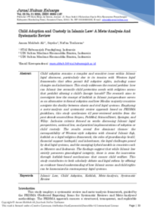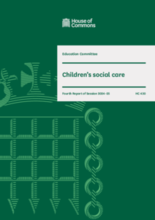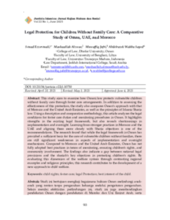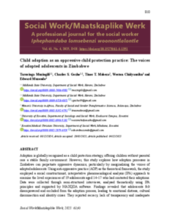Displaying 21 - 30 of 660
Child adoption remains a complex and sensitive issue within Islamic legal discourse, particularly due to its tension with Western legal frameworks that often permit full adoptive rights, including name changes and inheritance. This study addresses the central problem: how can Islamic law reconcile child protection needs with religious norms that prohibit altering a child’s lineage? The research aims to investigate how the concept of kafalah in Islamic jurisprudence serves as an alternative to formal adoption and how Muslim-majority countries navigate the duality between sharia and civil legal systems.
In this video, practitioners, faith leaders, and a Kafaalah caregiver share experiences in promoting and strengthening Kafaalah as an important part of family-based alternative care in Kenya.
This study examines Algeria’s use of kafala as a legally recognized alternative to adoption, highlighting its role in protecting the identity and citizenship rights of children of unknown parentage. While kafala aligns with Islamic principles and offers a protective framework, legal gaps, administrative barriers, and social stigma persist, underscoring the need for reforms to ensure children’s full legal identity and social inclusion.
This report makes a series of recommendations on issues affecting all types of care, including foster care, adoption, kinship care, children’s homes, and support for disabled children in the UK.
This study analyzes how Omani law protects vulnerable children without family care through foster arrangements, comparing it with practices in Morocco, the UAE, and the principles of Islamic Sharia law. While Oman’s legal framework provides a foundation for care, the research highlights weaknesses in implementation and oversight, recommending stronger monitoring, greater community involvement, and closer alignment with both regional best practices and Sharia objectives.
Adoption in Zimbabwe, while intended to provide stable families for children without parental care, often marginalizes adopted adolescents by excluding them from decisions, limiting transparency, and severing cultural ties. This study highlights the emotional distress and identity challenges this creates and calls for more inclusive, transparent, and culturally grounded adoption practices that uphold children’s rights and voices.
Using interdisciplinary analysis, Kit W. Myers examines the adoption of Asian, Black, and Native American children by White families in the United States. He shows how race has been constructed relationally to mark certain homes, families, and nations as spaces of love and better futures—in contrast to others that are not.
Parenting author Kayla Craig; Lauren Pinkston, Kindred Exchange; Kristin Langrehr, 111Project; and Stephanie Robinson, Faith to Action, share their own experiences of caring for orphans and adoption. Their reflections provide realistic ways to be involved in supporting orphaned and vulnerable children.
This contribution aims at highlighting principles as well as recommended practice to guide states in ensuring a cross-border kafāla placement is in the best interests of a child.
Since joining the European Union in 2007, Bulgaria has sought to make changes in its child welfare system for children raised in care institutions around the country. According to UNICEF, in 2021 there were 10,000 children living in alternative care in Bulgaria - most of them were ethnic Roma or children with disabilities. This is the story of how Bulgaria Without Orphans has played a role in Bulgaria's care reform.






